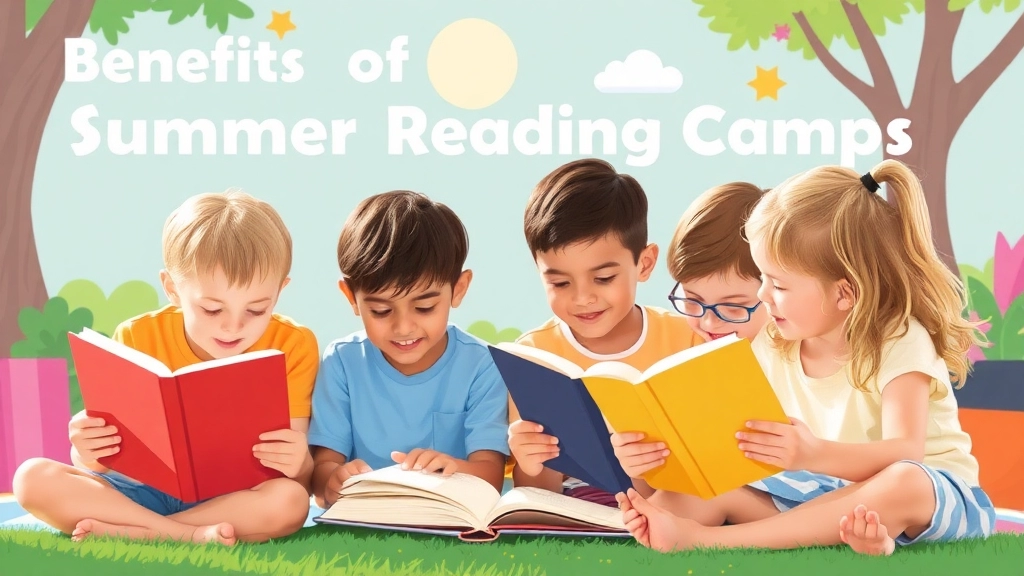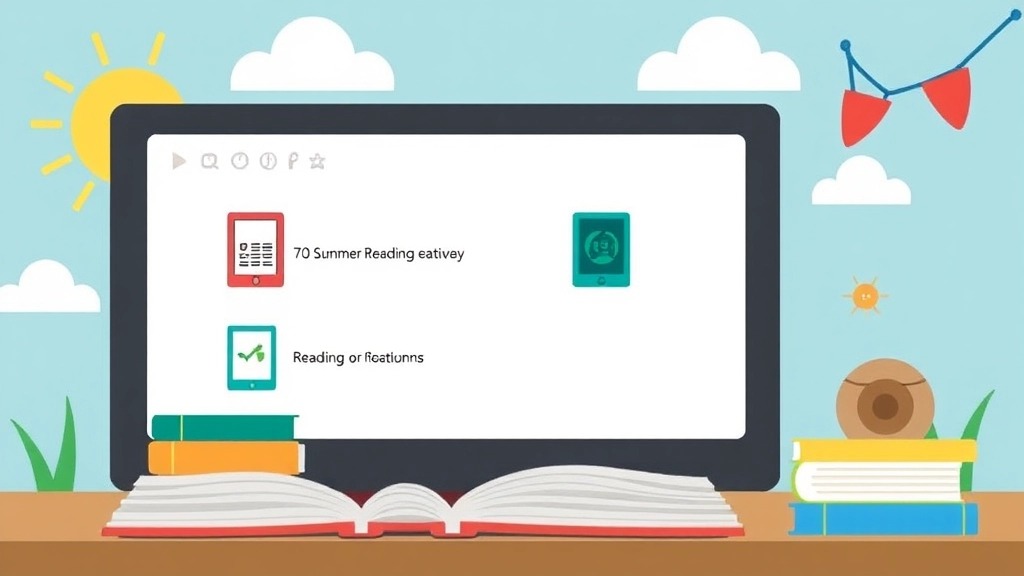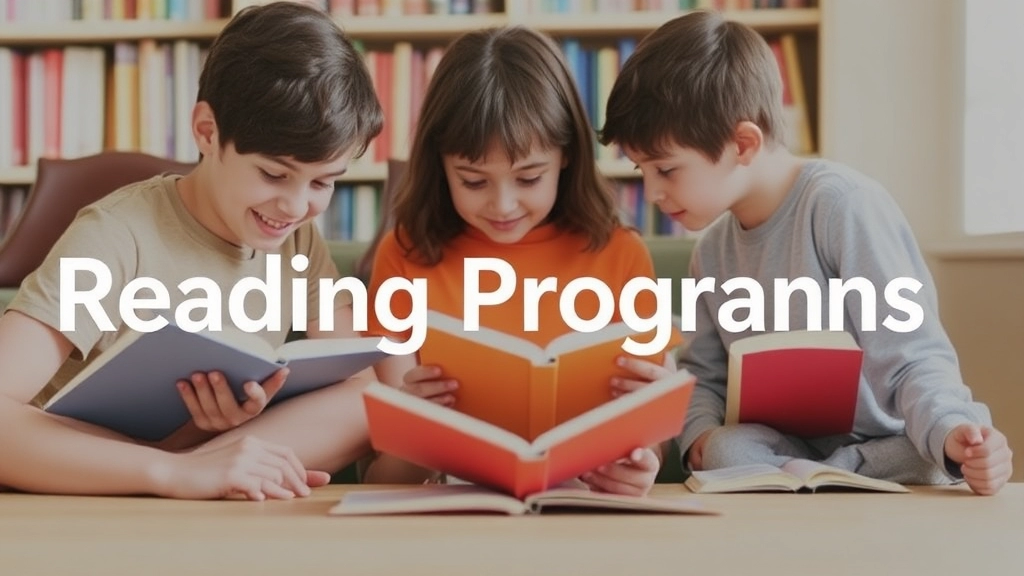Summer Camp Reading Programs
Summer camp reading programs are a fantastic way to keep kids engaged and learning during the break. As a parent, I know the struggle of trying to prevent the dreaded “summer slide.” These programs offer a variety of incentives like free books and digital rewards to keep children motivated and excited about reading.
Choosing the Right Summer Reading Camp
Choosing the right summer reading camp can make all the difference. From virtual options to community-based initiatives, there’s something for every child. Not only do these programs help maintain reading skills, but they also integrate fun activities, ensuring that learning doesn’t feel like a chore. Let’s dive into the best summer reading programs and how they can benefit your child.
Popular Summer Reading Programs for Kids
Are you worried about your child losing their reading skills over the summer? You’re not alone. Every parent wants to keep their kids sharp and engaged during the long summer break. That’s where popular summer reading programs for kids come into play. They’re designed to make reading fun and keep those brains ticking.
Why Summer Reading Programs Matter
Summer reading programs are essential because they combat the dreaded “summer slide.” You know, that time when kids forget everything they learned during the school year? Yeah, not fun. These programs keep kids engaged and help maintain their reading skills.
Top Summer Reading Programs
Let’s break down some of the most popular options out there:
- Library Reading Challenges
- Local Libraries: Many local libraries offer summer reading challenges with rewards for completing books or hours read.
- National Library Services: Some national library services have extensive summer reading plans with online tracking and rewards.
- Bookstore Programs
- Waterstones Summer Reading Challenge: Waterstones often has reading challenges where kids can earn rewards for reading a set number of books.
- WHSmith Summer Reading Club: WHSmith offers reading clubs with book lists and activities to keep kids engaged.
- Online Reading Platforms
- Reading Eggs: An interactive online reading platform that offers a summer reading program designed to keep kids engaged with fun, educational activities.
- Epic!: A digital library for kids 12 and under, offering a wide range of books and reading activities.
Real Stories, Real Results
Take Sarah, for instance. She enrolled her 8-year-old son in the local library’s summer reading challenge. Not only did he read more books than ever, but he also developed a genuine love for reading. The rewards and recognition he received boosted his confidence and made him eager to read even more.
How to Get Started
Getting started with a summer reading program is easier than you think. Here’s how:
- Visit Your Local Library: Check out what summer reading programs they offer. Most libraries have something for all age groups.
- Sign Up Online: Platforms like Reading Eggs and Epic! make it simple to sign up and start reading right away.
- Join Bookstore Clubs: Pop into your local Waterstones or WHSmith and ask about their summer reading clubs.
For more engaging summer activities, check out our fun activities at summer camp and discover the ultimate guide to summer camp sleepaway fun.
Benefits of Summer Reading Camps

Ever wondered why summer reading camps are all the rage?
Well, let’s dive in.
Why Summer Reading Camps?
First off, summer reading camps are a lifesaver for parents worried about the dreaded “summer slide.” You know, that brain drain kids experience when they’re out of school for too long.
Keeping Kids Engaged
One of the biggest benefits? These camps keep kids engaged.
No more endless hours of screen time.
Instead, they’re diving into books.
Boosting Reading Skills
Think about it.
Kids reading daily, discussing stories, and doing fun activities around books.
It’s like a workout for their brains.
Building a Love for Reading
Another win?
Kids often find a love for reading they didn’t know they had.
When reading is fun, it’s not a chore.
Social Skills
Plus, they make new friends.
Discussing books, working on projects, and just hanging out.
It’s social skills 101.
Structure and Routine
Camps also provide structure.
A routine that keeps kids on track.
No more “I’m bored” complaints.
Tailored Learning
Many camps tailor activities to different age groups and reading levels.
So, no one’s left behind.
Incentives and Rewards
Let’s not forget the incentives.
Stickers, certificates, even small prizes.
Kids love it.
Real Stories
I remember a parent telling me how her son, who hated reading, came back from camp asking for more books.
That’s the magic of summer reading camps.
Quick Benefits List:
- Keeps kids engaged
- Boosts reading skills
- Builds a love for reading
- Enhances social skills
- Provides structure and routine
- Tailored learning experiences
- Fun incentives and rewards
How to Choose the Right Reading Program
Alright, let’s cut to the chase. Choosing the right reading program for your kid is no small feat. You might be asking yourself, “How do I know which one is the best fit?” or “What if my child doesn’t enjoy it?” These are real concerns, and trust me, I get it. So, let’s break it down together and make this as straightforward as possible.
Know Your Kid’s Interests
First things first, know your kid’s interests. If your child loves dinosaurs, space, or fairy tales, look for programs that cater to those themes. When kids are interested in the subject matter, they’re more likely to engage and enjoy the reading process.
Assess the Program’s Structure
Next up, assess the program’s structure. Some programs are highly structured with daily reading logs and strict schedules. Others are more relaxed, allowing kids to read at their own pace. Think about what works best for your child:
- Highly Structured Programs: Great for kids who thrive on routine and need a bit of discipline.
- Flexible Programs: Ideal for kids who are self-motivated and prefer a more laid-back approach.
Look for Qualified Instructors
Qualified instructors can make a world of difference. Look for programs run by experienced educators or librarians who know how to make reading fun and engaging. They should be able to tailor their approach to suit different reading levels and learning styles.
Check Reviews and Testimonials
Don’t just take the program’s word for it. Check reviews and testimonials from other parents. Real feedback can give you insights into the program’s effectiveness and whether it’s worth the investment.
Consider the Format
Consider the format of the program. Are you looking for an in-person camp, a virtual program, or a hybrid option? Each has its pros and cons:
- In-Person Camps: Great for social interaction but may require commuting.
- Virtual Programs: Convenient and flexible but may lack face-to-face engagement.
- Hybrid Options: Offer a mix of both, providing flexibility and some level of personal interaction.
Evaluate the Cost
Let’s talk money. Evaluate the cost of the program. Some are free, while others can be quite pricey. Make sure you understand what you’re getting for your money. Sometimes, a higher cost means better resources and more personalised attention.
Look for Incentives and Rewards
Kids love rewards. Look for programs that offer incentives for reaching reading milestones. This could be anything from stickers and certificates to small prizes. These little rewards can keep kids motivated and excited about reading.
Trial Periods and Flexibility
Finally, see if the program offers a trial period or flexibility in case it’s not the right fit. You don’t want to be locked into something that isn’t working for your child.
Real-Life Example
Let me share a quick story. My neighbour, Jane, was struggling to find a reading program for her son, Tim. Tim loves anything to do with animals but gets bored quickly with structured activities. Jane found a virtual program that focused on animal stories and allowed Tim to read at his own pace. The program also had weekly virtual meet-ups with a zookeeper, which kept Tim excited and engaged. It was a win-win.
Virtual Summer Reading Options

Alright, let’s talk about virtual summer reading options.
Ever wondered how to keep your kids engaged with reading over the summer without dragging them to a library?
Yeah, I hear you.
Virtual reading programs are a lifesaver, especially when life gets busy, or you just want to avoid the hassle.
Here’s the lowdown.
Why Go Virtual?
- Convenience: No need to leave the house. Kids can read from the comfort of their own room.
- Flexibility: Fits into any schedule. Mornings, afternoons, or even late-night reading.
- Wide Selection: Access to a massive library of books online.
Top Virtual Reading Programs
- Epic!: Think of it as Netflix for books. Thousands of titles, audiobooks, and even educational videos.
- Audible: Perfect for auditory learners. Kids can listen to stories while doing other activities.
- Reading IQ: Tailored to your child’s reading level. Keeps them challenged but not overwhelmed.
How to Get Started
Step 1: Choose a platform. Look for one that suits your kid’s interests and reading level.
Step 2: Set a schedule. Consistency is key. Even 20 minutes a day makes a difference.
Step 3: Track progress. Many platforms have built-in trackers. Use them to keep your kid motivated.
Real Talk: Concerns and Solutions
Worried about screen time?
I get it. But balance is everything.
- Mix it up: Alternate between eBooks and physical books.
- Interactive features: Many platforms have games and quizzes that make reading more engaging.
Struggling with tech?
No worries.
- User-friendly apps: Most of these platforms are designed to be super intuitive.
- Parental controls: You can monitor what your kids are reading and for how long.
Virtual Reading Success Stories
I remember chatting with a mate over coffee. She was stressed about her son’s reading habits.
She tried Epic! and within a month, he was hooked on reading.
He even started discussing book plots at dinner!
Incentives and Rewards in Summer Reading Camps
Are you struggling to keep your kids engaged in reading over the summer? You’re not alone. Many parents worry about how to make reading fun and exciting for their children during the long summer break. That’s where incentives and rewards come in. Trust me, a little motivation can go a long way in turning reading from a chore into a cherished activity.
Why Use Incentives and Rewards?
First off, let’s get real. Kids love rewards. It’s like a built-in motivation system. Incentives and rewards in summer reading camps can make a massive difference in keeping your kids engaged. Here’s why:
- Instant Gratification: Kids get immediate satisfaction from rewards, making them more likely to stick with reading.
- Goal-Oriented: Rewards help set clear goals, making it easier for kids to understand what they need to achieve.
- Positive Reinforcement: It encourages a habit of reading by associating it with something positive.
Types of Rewards
Now, you might be wondering, “What kind of rewards work best?” Here are some tried-and-true options:
- Stickers and Badges: Simple but effective. Kids love collecting these.
- Certificates: A little recognition goes a long way.
- Small Toys or Trinkets: Think keychains, action figures, or even bookmarks.
- Extra Playtime: An extra 30 minutes of screen time or outdoor play can be a huge motivator.
- Books: Yes, more books! Let them pick out a new book as a reward for finishing their reading list.
Real-Life Examples
Let me share a quick story. My niece was never a big reader, but then she joined a summer reading camp that offered a “Reading Treasure Chest.” Each book she finished earned her a key to unlock the chest. Inside? Little toys and treats. By the end of the summer, she was hooked on reading and couldn’t wait to see what was in the chest next.
Another example is a local library that runs a “Reading Bingo.” Kids get a bingo card with different reading challenges. Complete a row, and they get a prize. It’s a fun way to mix things up and keep them engaged.
How to Implement Rewards
Alright, so how do you actually implement these rewards without turning your home into a bribe factory? Here are some tips:
- Set Clear Goals: Make sure your kids know exactly what they need to do to earn a reward.
- Keep It Consistent: Stick to the reward system you set up. Inconsistency can confuse kids and make the rewards less effective.
- Mix It Up: Keep the rewards varied to maintain interest. One week it could be stickers, the next week a small toy.
- Celebrate Achievements: Make a big deal out of their accomplishments. A little praise can go a long way.
If you’re looking for more ways to make your child’s summer camp experience unforgettable, check out our summer camp decoration ideas for a fun vibe. And for those who want to ensure a smooth preparation, don’t miss our summer camp packing hacks for stress-free prep.
Tips for Preventing the Summer Slide

Worried about your kid losing their reading skills over the summer? You’re not alone.
The summer slide is real, and it’s a concern for many parents.
But don’t fret—there are simple, effective ways to keep your child’s reading skills sharp.
Let’s dive in.
Make Reading Fun
Kids are more likely to read if they enjoy it.
- Choose books they love: Let them pick what they want to read. Comics, graphic novels, anything goes.
- Read together: Make it a bonding activity. Share stories, take turns reading aloud.
Set a Routine
Consistency is key.
- Daily reading time: Just 15-20 minutes a day can make a difference.
- Reading nook: Create a cosy spot with good lighting and comfy seating.
Use Technology
Kids love gadgets, so why not use them to your advantage?
- E-books and audiobooks: Great for on-the-go reading.
- Educational apps: There are tons of apps designed to make reading fun.
Mix It Up
Variety keeps things interesting.
- Different genres: Encourage them to explore fiction, non-fiction, poetry.
- Interactive books: Pop-up books, choose-your-own-adventure stories.
Set Goals and Rewards
Kids love a challenge, and they love rewards even more.
- Reading charts: Track their progress with stickers or stars.
- Incentives: Small rewards for reaching milestones—extra screen time, a new book, a trip to the ice cream shop.
Connect Reading to Activities
Make reading part of their everyday life.
- Cooking: Read recipes together and cook a meal.
- Nature walks: Read about local wildlife and then go explore.
Library Visits
Libraries are gold mines for summer reading.
- Summer reading programs: Many libraries offer these with fun activities and prizes.
- Book clubs: Join a kids’ book club to make reading social.
Lead by Example
Kids mimic what they see.
- Read your own books: Let them see you enjoying a good book.
- Discuss books: Talk about what you’re reading and share your thoughts.
Educational Trips
Turn trips into learning experiences.
- Museums and zoos: Read about the exhibits before you go.
- Historical sites: Learn the history and then visit.
Encourage Writing
Writing and reading go hand in hand.
- Journals: Keep a summer journal.
- Storytelling: Create stories together.
Preventing the summer slide doesn’t have to be a chore.
With these tips, you can make reading a fun, engaging part of your child’s summer.
Integrating Reading into Summer Activities
Ever wondered how to keep your kids engaged in reading during the summer without it feeling like a chore? You’re not alone. Many parents worry about how to maintain their children’s reading habits when school’s out. Let’s break it down and make it easy for you.
Why Integrate Reading into Summer Activities?
First off, why should you even bother integrating reading into summer activities? Simple. It helps prevent the dreaded “summer slide,” where kids lose some of the academic gains they’ve made during the school year. Plus, it keeps their brains active and engaged.
Make Reading Fun and Engaging
So, how do you make reading fun and not just another task on the to-do list? Here are some practical ideas:
- Reading Picnics: Pack a lunch, grab a blanket, and head to a local park. Bring along a few books and let your kids read in a new, exciting environment.
- Story Time at the Beach: If you’re heading to the beach, why not bring along a few waterproof books? Reading while listening to the waves can be incredibly relaxing.
- Book-Themed Crafts: After reading a story, get crafty. If your child just read “The Very Hungry Caterpillar,” make a caterpillar out of paper plates and paint.
- Reading Challenges: Create a summer reading challenge with a fun reward at the end. Maybe it’s a trip to the zoo or a new toy they’ve been eyeing.
Incorporate Reading into Daily Routines
Integrating reading into daily routines can make it feel less like a chore and more like a natural part of the day. Here’s how:
- Bedtime Stories: This is a classic for a reason. A bedtime story can be a calming end to the day.
- Morning Reading Time: Start the day with a short reading session. It sets a positive tone and gets their brains working.
- Reading During Travel: If you’re going on a road trip or taking a flight, pack some books. Audiobooks are also a fantastic option for car rides.
Use Technology to Your Advantage
In this digital age, there are tons of ways to integrate reading into summer activities using technology:
- E-Books and Audiobooks: These are great for on-the-go reading. Plus, many libraries offer free e-book and audiobook rentals.
- Educational Apps: There are plenty of apps designed to make reading fun. Look for ones that offer interactive stories and games.
- Online Book Clubs: Join an online book club where your child can discuss books with other kids. It adds a social element that can make reading more enjoyable.
Real-Life Examples
Let me share a quick story. Last summer, my friend Sarah was struggling to get her son, Jake, to read. She decided to turn their weekly trips to the local farmers’ market into a reading adventure. They would pick out a new fruit or vegetable, and then Jake would read about it in a book or online. Not only did Jake learn to love reading, but he also became quite the little chef!
Reading Programs by Age Group

Ever wondered if your child’s reading programme is the right fit for their age?
You’re not alone.
Let’s break it down, age by age, so you can pick the best one.
Early Years (Ages 3-5)
At this stage, it’s all about making reading fun.
Kids are just starting to recognise letters and sounds.
Look for programmes that include:
- Interactive Storytime: Think puppets, songs, and rhymes.
- Picture Books: Bright, colourful images to keep them engaged.
- Simple Activities: Colouring pages, matching games, and easy crafts.
Primary School (Ages 6-8)
Now, they’re learning to read on their own.
You want to build confidence and keep the excitement alive.
Great programmes for this age group often include:
- Phonics-Based Reading: Helps with word recognition.
- Short Chapter Books: Just long enough to challenge but not overwhelm.
- Reading Logs: Track progress and celebrate small wins.
Middle School (Ages 9-12)
Here’s where it gets tricky.
Kids are developing their own interests and might be less keen on structured reading.
Look for:
- Book Clubs: Social interaction can be a big motivator.
- Genre Exploration: Let them choose from adventure, mystery, sci-fi, etc.
- Reading Challenges: Gamify the experience with badges and points.
Teens (Ages 13-18)
Teens are a tough crowd.
They’ve got busy lives and reading might not be top of the list.
Consider these options:
- Young Adult Novels: Themes that resonate with their experiences.
- Digital Platforms: E-books, audiobooks, and online forums.
- Peer Recommendations: What are their friends reading? Peer influence is powerful.
Real Stories
I remember when my niece was 10.
She hated reading.
But then she joined a book club at her local library.
Suddenly, she couldn’t put books down.
It wasn’t the books; it was the social aspect that hooked her.
Community-Based Reading Initiatives
Ever wondered how to keep your kids engaged in reading during the summer? I get it; it’s not easy. But community-based reading initiatives might be the game-changer you need. These programmes aren’t just about books; they’re about building a culture of reading and learning right in your neighbourhood.
What Are Community-Based Reading Initiatives?
Community-based reading initiatives are local programmes designed to encourage reading among kids. These initiatives often involve public libraries, schools, and community centres working together to create fun and engaging reading activities. The goal? To foster a love for reading and learning beyond the classroom.
Why Should You Care?
You might be asking, “Why should I bother with these programmes?” Great question. Here are some solid reasons:
- Accessibility: These initiatives are usually free or low-cost, making them accessible to everyone.
- Social Interaction: Kids get to interact with their peers, which can make reading a more social and enjoyable activity.
- Variety: From book clubs to reading challenges, the variety keeps things fresh and exciting.
- Support: These programmes often come with resources to help parents support their child’s reading journey.
Real Stories, Real Impact
Let me share a quick story. In my local community, we have a programme called “Summer Reading Buddies.” It’s simple: older kids pair up with younger ones to read together. Not only does it improve reading skills, but it also builds friendships. One parent told me her shy daughter became more confident and started looking forward to these sessions every week.
How to Get Started
Ready to dive in? Here’s how you can get involved:
- Check with Your Local Library: Most libraries have summer reading programmes. Ask about community initiatives.
- School Programmes: Some schools offer summer reading camps or clubs. It’s worth checking out.
- Community Centres: These places often host reading events and activities. Pop in and see what’s on offer.
- Online Resources: Websites like Reading Rockets and Scholastic often list community programmes and events.
Making the Most of It
Now, let’s talk about how to maximise these opportunities:
- Get Involved: Volunteer to help out. Whether it’s reading to kids or organising events, your involvement can make a big difference.
- Encourage Participation: Make it a family affair. Attend events together and discuss the books you’re reading.
- Track Progress: Many programmes offer reading logs or journals. Use these to track your child’s progress and celebrate milestones.
If you’re looking for more ways to engage your kids this summer, consider checking out some engaging summer camp activities that can complement their reading journey.
Resources for Parents to Support Summer Reading
Worried about keeping your kids engaged in reading over the summer?
You’re not alone.
Many parents stress about the dreaded “summer slide” where kids lose some of the reading skills they’ve gained during the school year.
But don’t worry.
I’ve got your back with some killer resources to keep your kids flipping pages all summer long.
Library Programmes
First off, libraries are your best friend.
Many local libraries run summer reading programmes that are both fun and free.
Why are they awesome?
- Free books: No need to spend a fortune.
- Events and activities: Keeps kids excited about reading.
- Reading challenges: Kids love a good challenge, right?
Online Resources
Can’t make it to the library? No problem.
There are loads of online resources that can keep your kids engaged.
Top Picks:
- Audible: Audiobooks can be a game-changer, especially for kids who are more auditory learners.
- Epic!: An online library for kids 12 and under. Tons of books, and it’s super interactive.
- Storyline Online: Celebrities reading books. Need I say more?
Book Clubs
Ever thought about starting a book club?
It’s easier than you think and can be a blast.
How to Get Started:
- Pick a book: Something age-appropriate and interesting.
- Set a schedule: Weekly or bi-weekly meetings.
- Discussion questions: Keep it light but engaging.
Apps and Games
Kids love their gadgets.
So why not use them for good?
Must-Try Apps:
- Reading Eggs: Fun games that teach reading.
- Hooked on Phonics: Classic but effective.
- Libby: Borrow eBooks and audiobooks from your local library.
Incentives and Rewards
Kids love rewards.
Set up a simple system to keep them motivated.
Ideas:
- Stickers: A classic that never gets old.
- Small toys or treats: For hitting reading milestones.
- Extra screen time: A little extra time on their favourite game or show.
Family Reading Time
Make reading a family affair.
Why it works:
- Bonding time: You get to spend quality time together.
- Sets a good example: Kids are more likely to read if they see you doing it.
Summer Reading Lists
Sometimes, kids just need a little direction.
Where to Find Great Lists:
- School recommendations: Teachers often have great suggestions.
- Online: Websites like Goodreads have lists for all ages.
- Bookstores: Staff picks are usually spot-on.
Storytelling Sessions
Reading doesn’t always have to be about books.
Try This:
- Make up stories: Take turns adding to the story.
- Story cards: Use cards to create random stories.
Community Events
Check out what’s happening in your community.
Look for:
- Storytime sessions: Often held at libraries or community centres.
- Book fairs: Great for finding new books and meeting authors.
- Reading festivals: Fun and educational.
For more ideas on keeping your kids engaged and learning during the summer, check out our Ultimate Guide to Summer Sports Camps for Kids and our Top Summer Skateboarding Camps for All Levels.
FAQs on Summer Camp Reading
What are the main benefits of summer reading camps?
Summer reading camps help prevent the “summer slide,” keep kids engaged, boost reading skills, build a love for reading, enhance social skills, provide structure and routine, offer tailored learning experiences, and include fun incentives and rewards.
How do summer reading camps keep kids engaged?
These camps replace screen time with reading activities, discussions, and fun projects related to books, making learning enjoyable and interactive.
Can summer reading camps help improve my child’s reading skills?
Absolutely! By reading daily, discussing stories, and participating in related activities, kids can significantly improve their reading skills.
What social benefits do summer reading camps offer?
Kids make new friends, engage in discussions, work on group projects, and enhance their social skills through interaction with peers.
Are there any virtual summer reading options available?
Yes, there are several virtual reading programs like Epic!, Audible, and Reading IQ that offer convenience, flexibility, and a wide selection of books.
How can I prevent the summer slide in my child’s reading skills?
Make reading fun, set a routine, use technology, mix up reading materials, set goals and rewards, connect reading to activities, visit libraries, lead by example, take educational trips, and encourage writing.
What are some tips for making reading fun for kids?
Choose books they love, read together, explore different genres, and use interactive books like pop-up books and choose-your-own-adventure stories.
How can I use technology to support my child’s reading over the summer?
E-books, audiobooks, and educational apps can make reading accessible and engaging, especially for on-the-go reading.
What are some effective reading programs by age group?
For ages 3-5, look for interactive storytime and picture books. Ages 6-8 benefit from phonics-based reading and short chapter books. Ages 9-12 enjoy book clubs and genre exploration. Teens prefer young adult novels and digital platforms.
What are some incentives to encourage kids to read during the summer?
Use reading charts to track progress, offer small rewards for milestones, and consider fun incentives like extra screen time, new books, or trips to the ice cream shop.
How can I connect reading to everyday activities?
Incorporate reading into activities like cooking (reading recipes) and nature walks (reading about local wildlife), making it a part of their daily life.
Why is it important to lead by example when encouraging kids to read?
Kids mimic what they see. If they see you enjoying reading and discussing books, they are more likely to develop a similar interest.
References
-
The Benefits of Summer Reading
-
Preventing the Summer Slide
-
Top Summer Reading Programs for Kids

